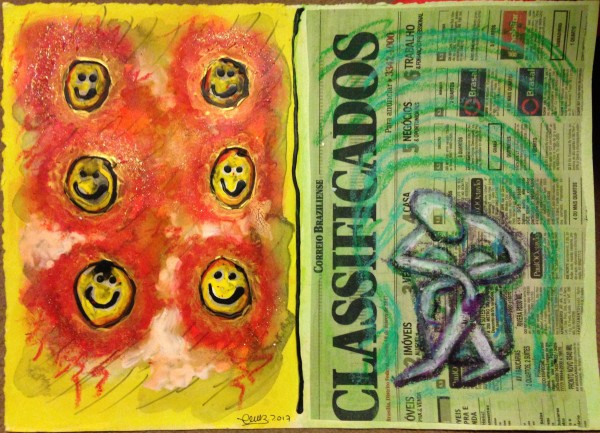[Originalmente redigido como trabalho de faculdade de Jornalismo, posteriormente adaptado e postado no portal MULTARTE Arte e Cultura Brasileira em 2002, republico aqui este texto de minha autoria, sobre o curta “Ilha das Flores”, de Jorge Furtado]
ILHA DAS FLORES, realizado por estudantes gaúchos de cinema em 1989, demonstra que é possível a criatividade com poucos recursos.
Trata-se de um premiado e festejado curta que, com uma produção modesta, constrói uma narrativa extremamente instigante no tocante ao seu conteúdo. Exatamente por isso, é uma demonstração (dentre as muitas que têm aparecido no recente cenário artístico) das mais eloquentes de como, sem recorrer a produções de porte faraônico-hollywoodiano, uma obra de arte pode ser tão bem elaborada no plano técnico e ao mesmo tempo comunicativa, sem hermetismos eruditos ou malabarismos virtuosísticos. Enfim, algo para ser entendido – e curtido.
Disponível também em versões legendadas para o inglês, francês, alemão e espanhol, ILHA DAS FLORES é uma verdadeira parábola sobre a condição humana – ou pelo menos uma de suas facetas: a de como a ausência de liberdade (i.e. a outorga ao indivíduo em particular e à sociedade em geral o direito de ir e vir, bem como o direito a uma vida em condições dignas) pode levar gente a se sujeitar a situações aviltantes em troca de uma sobrevivência quase ou totalmente vegetativa. De como o ser humano, na eterna luta pela sobrevivência, trata de se contentar com qualquer coisa ao seu alcance – até mesmo LIXO.
No plano técnico, a narrativa apresenta-se com um estilo que poderia assim ser chamado de: “irônico-didático”, com generosas doses de metalinguagem, ao “explicar” cada um dos componentes apresentados em seu desenrolar; há também características de documentário em algumas passagens, tanto que este curta costuma ser genericamente denominado como “documentário” pelos meios afora. Da aparente miscelânea nonsense, entre conteúdo e partes nele envolvidas (incluindo personagens de carne e osso), vai-se gradativamente fazendo surgir uma ideia comum: a de como a sociedade de fato, mesmo não se conhecendo os indivíduos, encontra-se envolvida em uma mesma questão – a do direito a uma existência digna.
Há na obra uma intensa relação sonoridade-imagem, com elementos repetitivos e encadeados entre si, em um continuum – ou seria talvez “crescendo social?” – que leva ao desfecho da reflexão final sobre a condição humana, via Cecília Meireles (“Liberdade é uma palavra que o sonho humano alimenta, que não há ninguém que explique e ninguém que não entenda”). Apesar dos momentos jocosos, hilariantes até, a narrativa vai gradativamente conduzindo o espectador a uma conclusão final, que é séria. E tudo isto em apenas 12 minutos de duração.
Apesar das técnicas empregadas nesta película serem de uso corriqueiro em productions do tipo Walt Disney, ILHA DAS FLORES (que bem poderia servir de título a uma produção desse porte) pode ser considerado como um magnífico ANTI-DISNEY… Sem a costumeira pieguice que assola tais produções. Um verdadeiro colírio artístico para aqueles que, como eu, acreditam que bom cinema não depende de grandiloquências hollywoodianas para tornar uma obra perene: a velha fórmula da “câmera na mão e uma ideia na cabeça” ainda funciona.
Brasília, DF, 15/03/2002
ILHA DAS FLORES [Ficha técnica]
Brasil, 1989 (35 mm, 12 minutos, cor)
Direção: Jorge Furtado
Produção executiva: Monica Schimiedt, Giba Assis Brasil e Nora Goulart
Roteiro: Jorge Furtado
Direção de fotografia: Roberto Henkin e Sérgio Amon
Direção de arte: Fiapo Barth
Música: Geraldo Flach
Direção de produção: Nora Goulart
Montagem: Giba Assis Brasil
Assistente de direção: Ana Luiza Azevedo
Uma produção da Casa de Cinema de Porto Alegre
Elenco principal: Paulo José (narração) e Ciça Reckziegel (Dona Anete)
//platform.instagram.com/en_US/embeds.js



Você precisa fazer login para comentar.